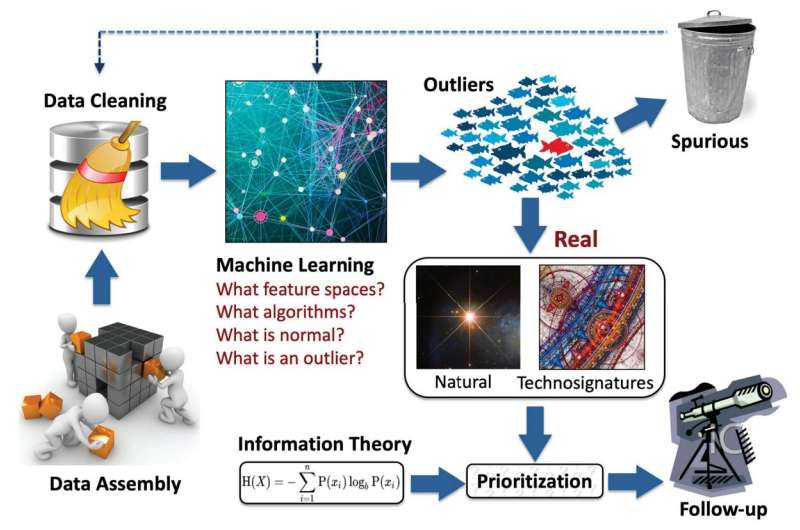September 14, 2023 report
This article has been reviewed according to Science X's editorial process and policies. Editors have highlighted the following attributes while ensuring the content's credibility:
fact-checked
preprint
trusted source
proofread
Scientists suggest use of data-driven approach to look for life on other planets

A large team of scientists with a wide variety of backgrounds has joined together to suggest that a data-driven approach to search for life elsewhere in the universe should replace methods now in use. In their paper posted on the arXiv preprint server, the group explains how a data-driven approach could help prevent human-centered biases from overlooking potential signs of life.
Over the past few decades, scientists have become much more open to the possibility of discovering life in places other than on Earth. And because of that, more work has been done to find life—or at least signs of it. But, as the group on this new effort points out, most such approaches tend to expect that other forms of life will resemble those found on Earth. And that could be blinding scientists to signs of life that might be there but are being missed.
To overcome such a problem, the researchers suggest a more data-driven approach be used. They note that a lot of data have been obtained regarding various parts of the night sky. They also note that the data are in different formats. Some are radio wave graphs, while others describe the attributes of light emitted by a section of the sky, or even a given planet.
Such data, they suggest, are reminiscent of the mass of data that can be found on the internet that relates to various activities, mostly by humans. They further note that such data have been used to find out new things, to spot trends, or even to make up new things that might be related to other things—through the use of AI applications.
This, they argue, suggests that a similar approach could be used to study the huge amounts of data that have been accumulated by decades of space research. Doing so, they further argue, could help find things that stand out in ways that have not been noticed before. A given star system, for example, may have unique attributes that scientists have not yet noticed because they have been looking for signs that relate to the types of life we expect to see.
They conclude by suggesting specific types of data-driven research be conducted on data that currently exist, such as that collected by all-sky surveys done using far-infrared wavelength devices. Another approach could involve data mining on the results of large sky surveys, or of surveys that were done with radio astronomical interferometers, or even research that involved known artifacts in the solar system.
More information: T. Joseph W. Lazio et al, Data-Driven Approaches to Searches for the Technosignatures of Advanced Civilizations, arXiv (2023). DOI: 10.48550/arxiv.2308.15518
Journal information: arXiv
© 2023 Science X Network





















